A Report: Ramifications of Increasing Numbers of Urgent Care Clinics
VerifiedAdded on 2023/01/12
|18
|6367
|48
Report
AI Summary
This report investigates the implications of the growing number of urgent care clinics within the healthcare sector. It begins by defining urgent care and its role, highlighting the need for such facilities due to increased patient pressure and emergency situations. The report explores the ramifications of this expansion, including potential impacts on healthcare costs, patient outcomes, and the efficiency of medical services. It also analyzes the role of healthcare professionals in promoting and utilizing urgent care clinics for the welfare of citizens. The methodology includes research questions, objectives, and a literature review examining existing studies. The report aims to provide a comprehensive understanding of the benefits and challenges associated with the rise of urgent care clinics, offering insights into their impact on healthcare delivery and patient access to timely medical attention. It also addresses ethical considerations and potential outcomes related to the expansion of these clinics, providing a valuable resource for students and professionals interested in healthcare management and policy.
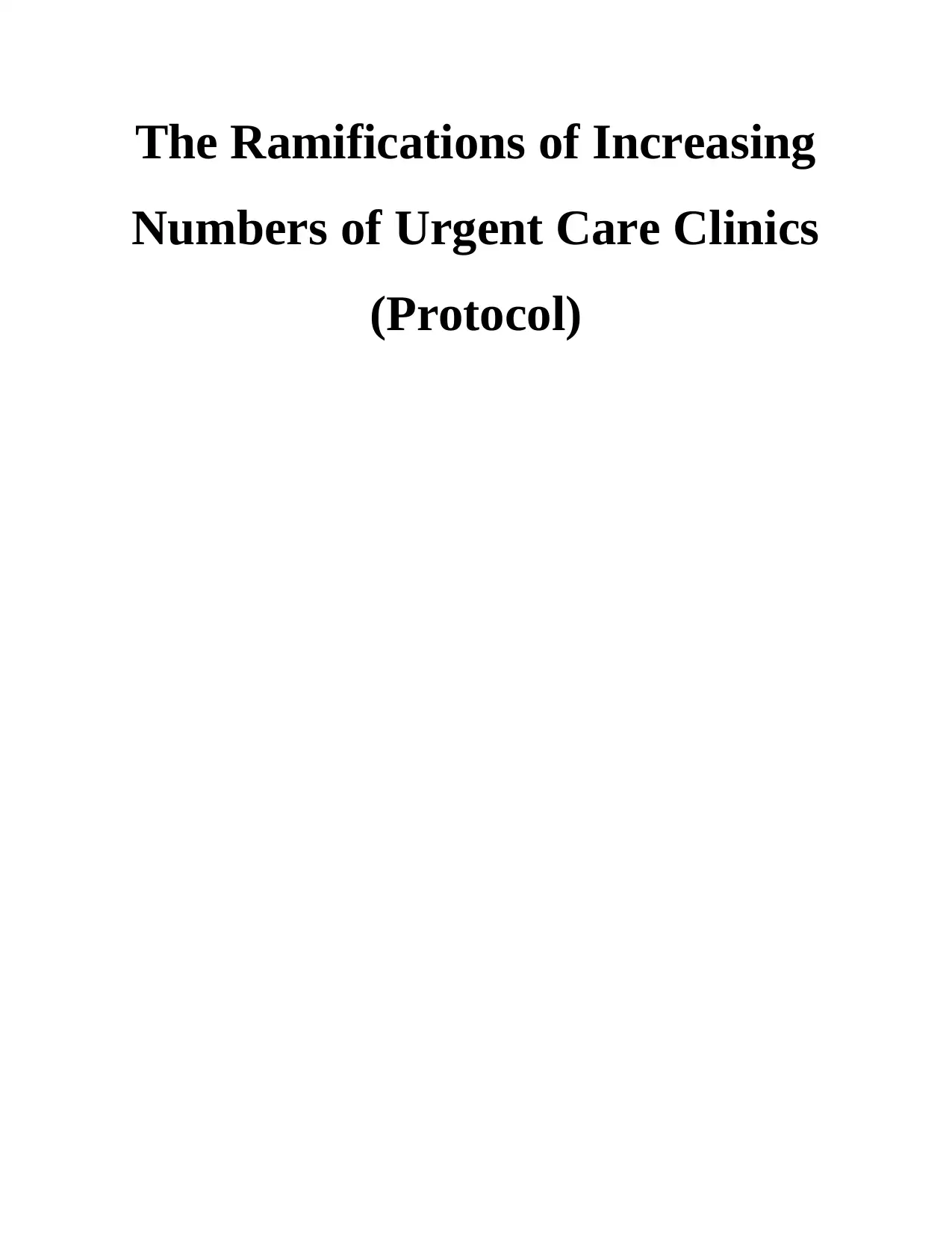
The Ramifications of Increasing
Numbers of Urgent Care Clinics
(Protocol)
Numbers of Urgent Care Clinics
(Protocol)
Paraphrase This Document
Need a fresh take? Get an instant paraphrase of this document with our AI Paraphraser
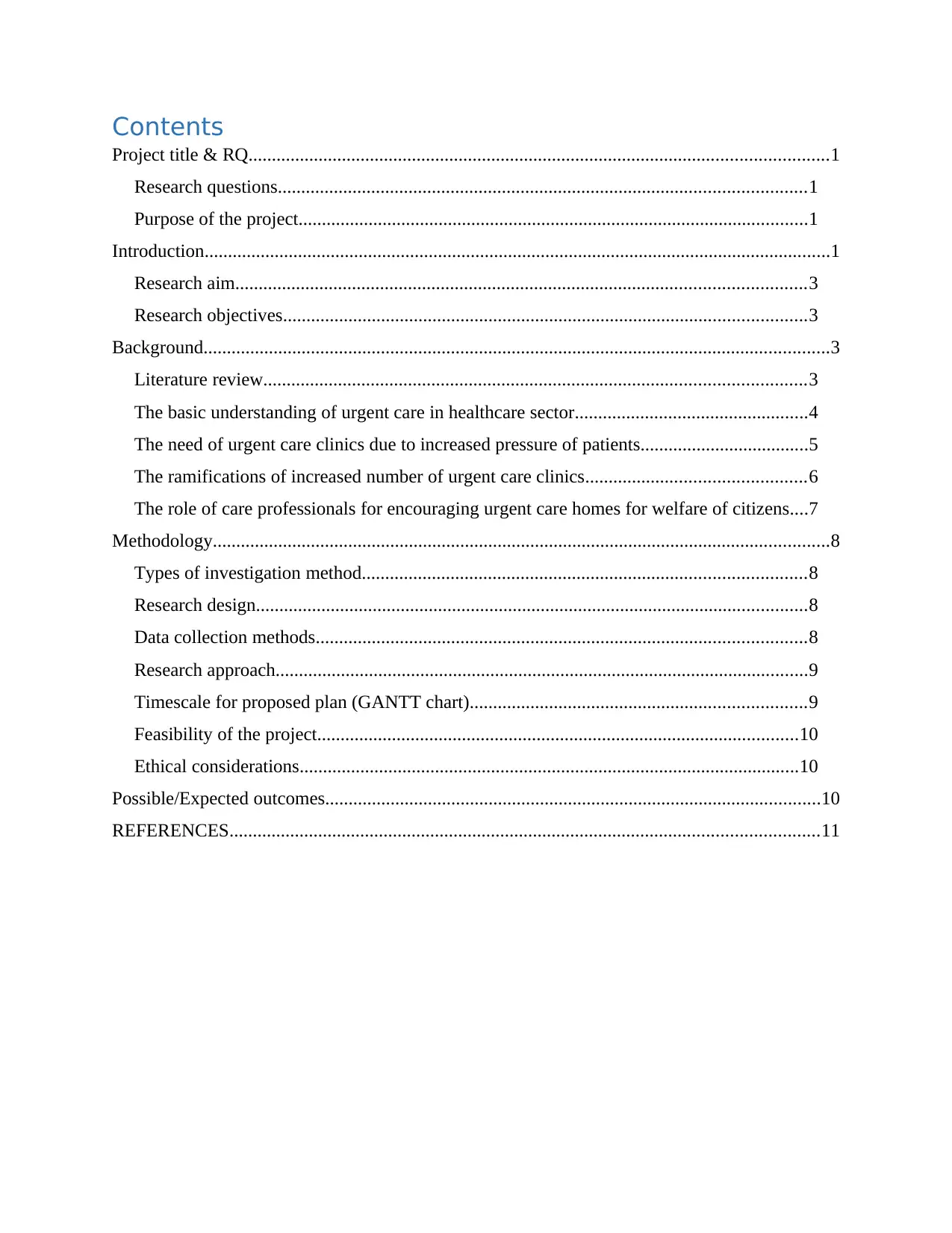
Contents
Project title & RQ............................................................................................................................1
Research questions.................................................................................................................1
Purpose of the project.............................................................................................................1
Introduction......................................................................................................................................1
Research aim..........................................................................................................................3
Research objectives................................................................................................................3
Background......................................................................................................................................3
Literature review....................................................................................................................3
The basic understanding of urgent care in healthcare sector..................................................4
The need of urgent care clinics due to increased pressure of patients....................................5
The ramifications of increased number of urgent care clinics...............................................6
The role of care professionals for encouraging urgent care homes for welfare of citizens....7
Methodology....................................................................................................................................8
Types of investigation method...............................................................................................8
Research design......................................................................................................................8
Data collection methods.........................................................................................................8
Research approach..................................................................................................................9
Timescale for proposed plan (GANTT chart)........................................................................9
Feasibility of the project.......................................................................................................10
Ethical considerations...........................................................................................................10
Possible/Expected outcomes..........................................................................................................10
REFERENCES..............................................................................................................................11
Project title & RQ............................................................................................................................1
Research questions.................................................................................................................1
Purpose of the project.............................................................................................................1
Introduction......................................................................................................................................1
Research aim..........................................................................................................................3
Research objectives................................................................................................................3
Background......................................................................................................................................3
Literature review....................................................................................................................3
The basic understanding of urgent care in healthcare sector..................................................4
The need of urgent care clinics due to increased pressure of patients....................................5
The ramifications of increased number of urgent care clinics...............................................6
The role of care professionals for encouraging urgent care homes for welfare of citizens....7
Methodology....................................................................................................................................8
Types of investigation method...............................................................................................8
Research design......................................................................................................................8
Data collection methods.........................................................................................................8
Research approach..................................................................................................................9
Timescale for proposed plan (GANTT chart)........................................................................9
Feasibility of the project.......................................................................................................10
Ethical considerations...........................................................................................................10
Possible/Expected outcomes..........................................................................................................10
REFERENCES..............................................................................................................................11

⊘ This is a preview!⊘
Do you want full access?
Subscribe today to unlock all pages.

Trusted by 1+ million students worldwide
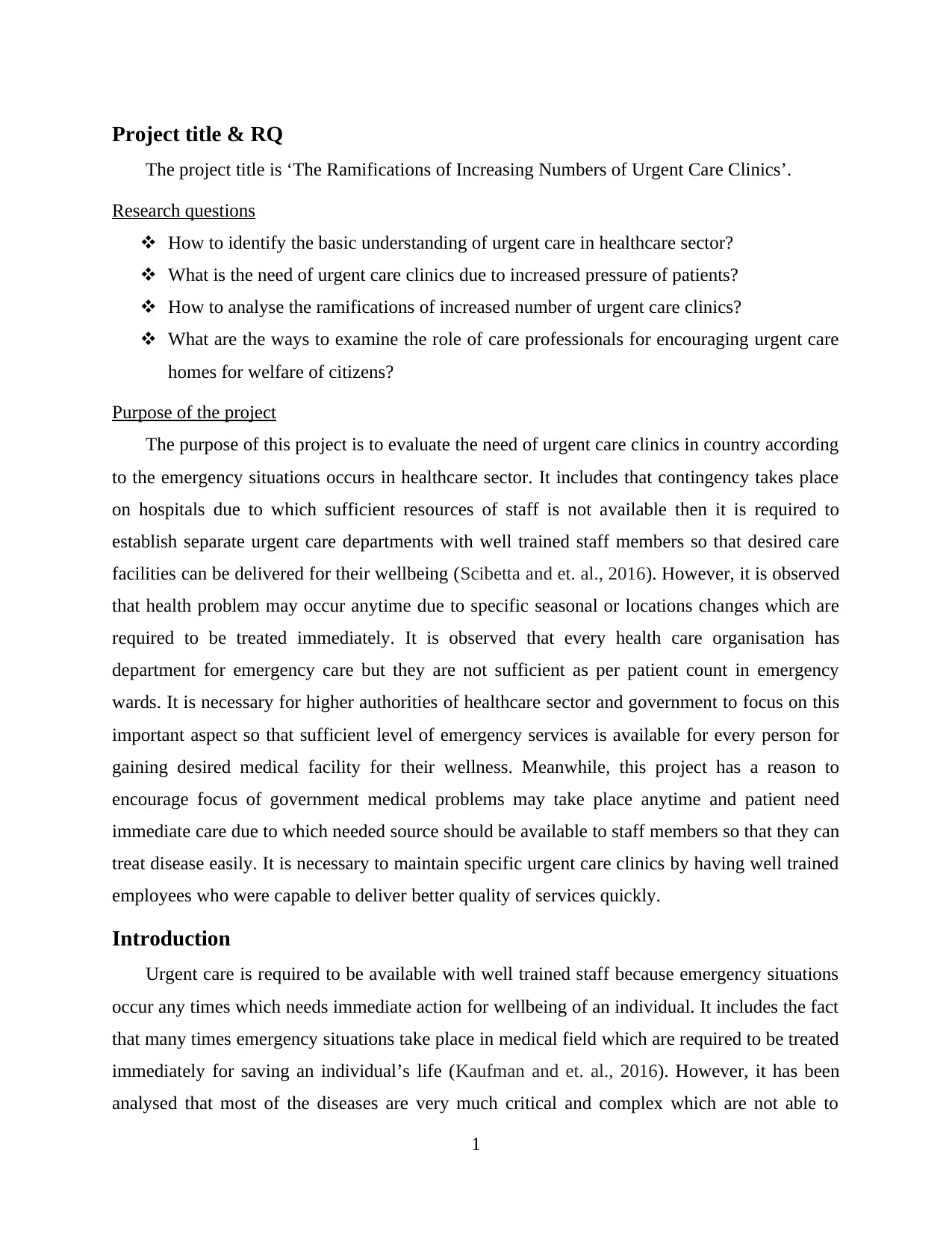
Project title & RQ
The project title is ‘The Ramifications of Increasing Numbers of Urgent Care Clinics’.
Research questions
How to identify the basic understanding of urgent care in healthcare sector?
What is the need of urgent care clinics due to increased pressure of patients?
How to analyse the ramifications of increased number of urgent care clinics?
What are the ways to examine the role of care professionals for encouraging urgent care
homes for welfare of citizens?
Purpose of the project
The purpose of this project is to evaluate the need of urgent care clinics in country according
to the emergency situations occurs in healthcare sector. It includes that contingency takes place
on hospitals due to which sufficient resources of staff is not available then it is required to
establish separate urgent care departments with well trained staff members so that desired care
facilities can be delivered for their wellbeing (Scibetta and et. al., 2016). However, it is observed
that health problem may occur anytime due to specific seasonal or locations changes which are
required to be treated immediately. It is observed that every health care organisation has
department for emergency care but they are not sufficient as per patient count in emergency
wards. It is necessary for higher authorities of healthcare sector and government to focus on this
important aspect so that sufficient level of emergency services is available for every person for
gaining desired medical facility for their wellness. Meanwhile, this project has a reason to
encourage focus of government medical problems may take place anytime and patient need
immediate care due to which needed source should be available to staff members so that they can
treat disease easily. It is necessary to maintain specific urgent care clinics by having well trained
employees who were capable to deliver better quality of services quickly.
Introduction
Urgent care is required to be available with well trained staff because emergency situations
occur any times which needs immediate action for wellbeing of an individual. It includes the fact
that many times emergency situations take place in medical field which are required to be treated
immediately for saving an individual’s life (Kaufman and et. al., 2016). However, it has been
analysed that most of the diseases are very much critical and complex which are not able to
1
The project title is ‘The Ramifications of Increasing Numbers of Urgent Care Clinics’.
Research questions
How to identify the basic understanding of urgent care in healthcare sector?
What is the need of urgent care clinics due to increased pressure of patients?
How to analyse the ramifications of increased number of urgent care clinics?
What are the ways to examine the role of care professionals for encouraging urgent care
homes for welfare of citizens?
Purpose of the project
The purpose of this project is to evaluate the need of urgent care clinics in country according
to the emergency situations occurs in healthcare sector. It includes that contingency takes place
on hospitals due to which sufficient resources of staff is not available then it is required to
establish separate urgent care departments with well trained staff members so that desired care
facilities can be delivered for their wellbeing (Scibetta and et. al., 2016). However, it is observed
that health problem may occur anytime due to specific seasonal or locations changes which are
required to be treated immediately. It is observed that every health care organisation has
department for emergency care but they are not sufficient as per patient count in emergency
wards. It is necessary for higher authorities of healthcare sector and government to focus on this
important aspect so that sufficient level of emergency services is available for every person for
gaining desired medical facility for their wellness. Meanwhile, this project has a reason to
encourage focus of government medical problems may take place anytime and patient need
immediate care due to which needed source should be available to staff members so that they can
treat disease easily. It is necessary to maintain specific urgent care clinics by having well trained
employees who were capable to deliver better quality of services quickly.
Introduction
Urgent care is required to be available with well trained staff because emergency situations
occur any times which needs immediate action for wellbeing of an individual. It includes the fact
that many times emergency situations take place in medical field which are required to be treated
immediately for saving an individual’s life (Kaufman and et. al., 2016). However, it has been
analysed that most of the diseases are very much critical and complex which are not able to
1
Paraphrase This Document
Need a fresh take? Get an instant paraphrase of this document with our AI Paraphraser
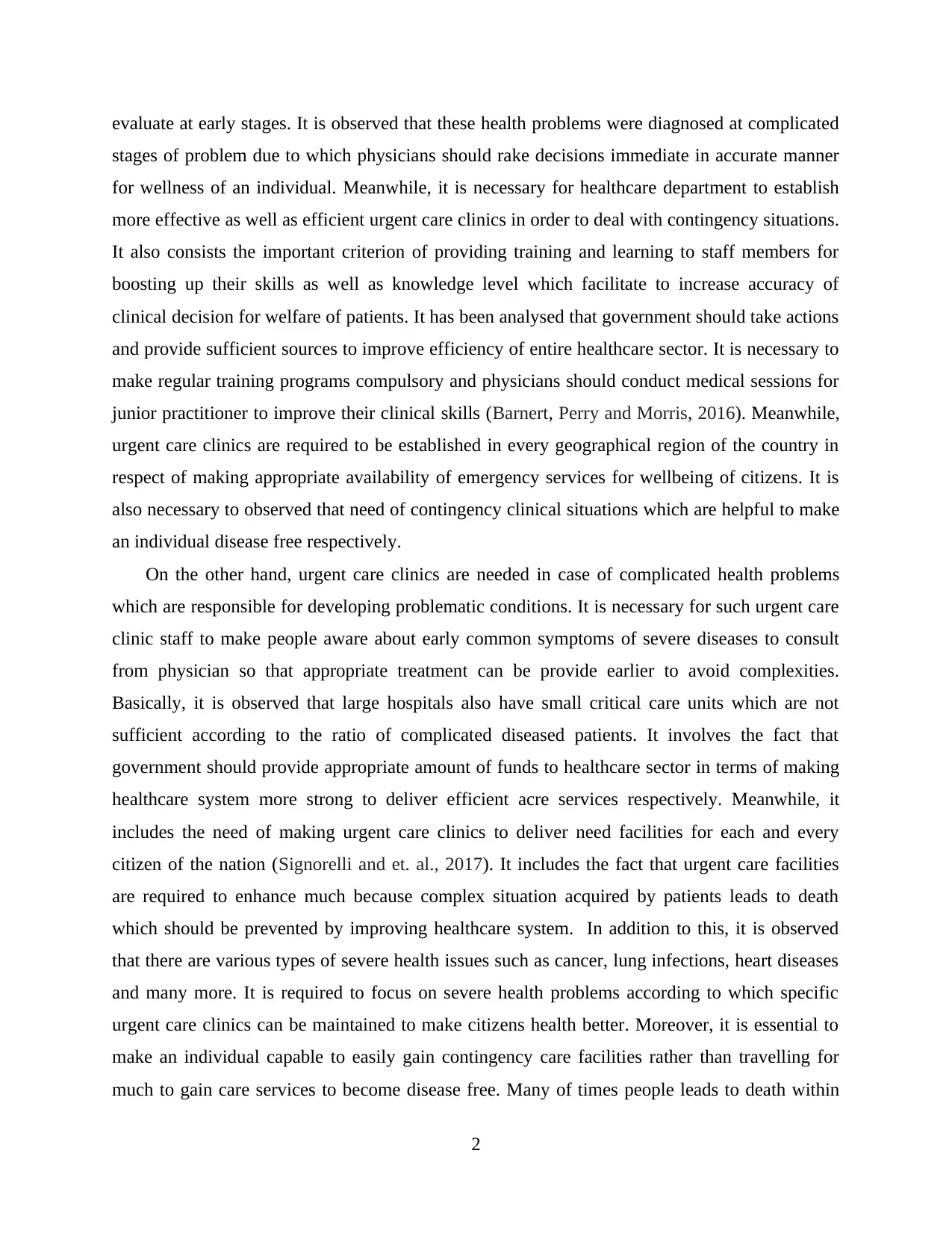
evaluate at early stages. It is observed that these health problems were diagnosed at complicated
stages of problem due to which physicians should rake decisions immediate in accurate manner
for wellness of an individual. Meanwhile, it is necessary for healthcare department to establish
more effective as well as efficient urgent care clinics in order to deal with contingency situations.
It also consists the important criterion of providing training and learning to staff members for
boosting up their skills as well as knowledge level which facilitate to increase accuracy of
clinical decision for welfare of patients. It has been analysed that government should take actions
and provide sufficient sources to improve efficiency of entire healthcare sector. It is necessary to
make regular training programs compulsory and physicians should conduct medical sessions for
junior practitioner to improve their clinical skills (Barnert, Perry and Morris, 2016). Meanwhile,
urgent care clinics are required to be established in every geographical region of the country in
respect of making appropriate availability of emergency services for wellbeing of citizens. It is
also necessary to observed that need of contingency clinical situations which are helpful to make
an individual disease free respectively.
On the other hand, urgent care clinics are needed in case of complicated health problems
which are responsible for developing problematic conditions. It is necessary for such urgent care
clinic staff to make people aware about early common symptoms of severe diseases to consult
from physician so that appropriate treatment can be provide earlier to avoid complexities.
Basically, it is observed that large hospitals also have small critical care units which are not
sufficient according to the ratio of complicated diseased patients. It involves the fact that
government should provide appropriate amount of funds to healthcare sector in terms of making
healthcare system more strong to deliver efficient acre services respectively. Meanwhile, it
includes the need of making urgent care clinics to deliver need facilities for each and every
citizen of the nation (Signorelli and et. al., 2017). It includes the fact that urgent care facilities
are required to enhance much because complex situation acquired by patients leads to death
which should be prevented by improving healthcare system. In addition to this, it is observed
that there are various types of severe health issues such as cancer, lung infections, heart diseases
and many more. It is required to focus on severe health problems according to which specific
urgent care clinics can be maintained to make citizens health better. Moreover, it is essential to
make an individual capable to easily gain contingency care facilities rather than travelling for
much to gain care services to become disease free. Many of times people leads to death within
2
stages of problem due to which physicians should rake decisions immediate in accurate manner
for wellness of an individual. Meanwhile, it is necessary for healthcare department to establish
more effective as well as efficient urgent care clinics in order to deal with contingency situations.
It also consists the important criterion of providing training and learning to staff members for
boosting up their skills as well as knowledge level which facilitate to increase accuracy of
clinical decision for welfare of patients. It has been analysed that government should take actions
and provide sufficient sources to improve efficiency of entire healthcare sector. It is necessary to
make regular training programs compulsory and physicians should conduct medical sessions for
junior practitioner to improve their clinical skills (Barnert, Perry and Morris, 2016). Meanwhile,
urgent care clinics are required to be established in every geographical region of the country in
respect of making appropriate availability of emergency services for wellbeing of citizens. It is
also necessary to observed that need of contingency clinical situations which are helpful to make
an individual disease free respectively.
On the other hand, urgent care clinics are needed in case of complicated health problems
which are responsible for developing problematic conditions. It is necessary for such urgent care
clinic staff to make people aware about early common symptoms of severe diseases to consult
from physician so that appropriate treatment can be provide earlier to avoid complexities.
Basically, it is observed that large hospitals also have small critical care units which are not
sufficient according to the ratio of complicated diseased patients. It involves the fact that
government should provide appropriate amount of funds to healthcare sector in terms of making
healthcare system more strong to deliver efficient acre services respectively. Meanwhile, it
includes the need of making urgent care clinics to deliver need facilities for each and every
citizen of the nation (Signorelli and et. al., 2017). It includes the fact that urgent care facilities
are required to enhance much because complex situation acquired by patients leads to death
which should be prevented by improving healthcare system. In addition to this, it is observed
that there are various types of severe health issues such as cancer, lung infections, heart diseases
and many more. It is required to focus on severe health problems according to which specific
urgent care clinics can be maintained to make citizens health better. Moreover, it is essential to
make an individual capable to easily gain contingency care facilities rather than travelling for
much to gain care services to become disease free. Many of times people leads to death within
2
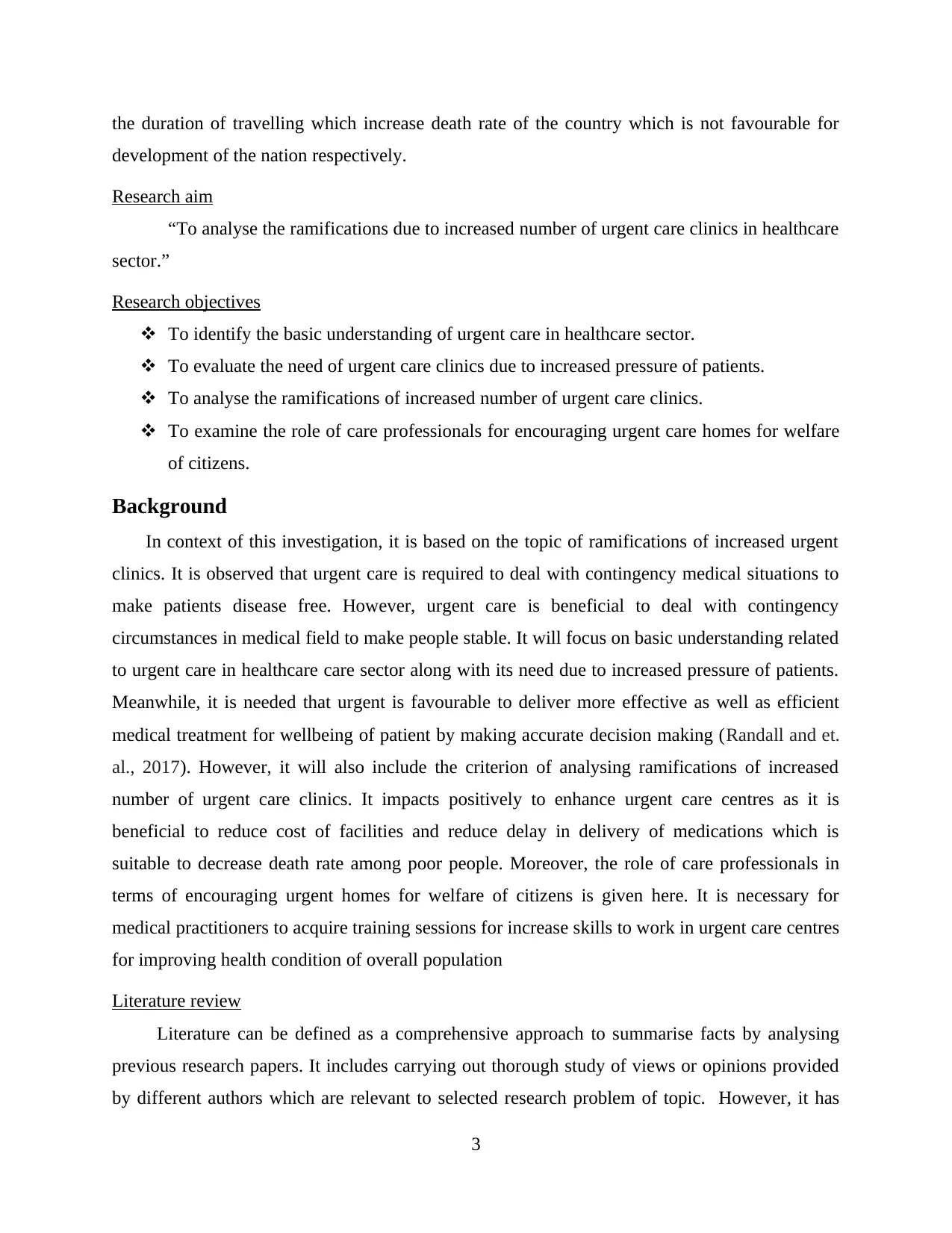
the duration of travelling which increase death rate of the country which is not favourable for
development of the nation respectively.
Research aim
“To analyse the ramifications due to increased number of urgent care clinics in healthcare
sector.”
Research objectives
To identify the basic understanding of urgent care in healthcare sector.
To evaluate the need of urgent care clinics due to increased pressure of patients.
To analyse the ramifications of increased number of urgent care clinics.
To examine the role of care professionals for encouraging urgent care homes for welfare
of citizens.
Background
In context of this investigation, it is based on the topic of ramifications of increased urgent
clinics. It is observed that urgent care is required to deal with contingency medical situations to
make patients disease free. However, urgent care is beneficial to deal with contingency
circumstances in medical field to make people stable. It will focus on basic understanding related
to urgent care in healthcare care sector along with its need due to increased pressure of patients.
Meanwhile, it is needed that urgent is favourable to deliver more effective as well as efficient
medical treatment for wellbeing of patient by making accurate decision making (Randall and et.
al., 2017). However, it will also include the criterion of analysing ramifications of increased
number of urgent care clinics. It impacts positively to enhance urgent care centres as it is
beneficial to reduce cost of facilities and reduce delay in delivery of medications which is
suitable to decrease death rate among poor people. Moreover, the role of care professionals in
terms of encouraging urgent homes for welfare of citizens is given here. It is necessary for
medical practitioners to acquire training sessions for increase skills to work in urgent care centres
for improving health condition of overall population
Literature review
Literature can be defined as a comprehensive approach to summarise facts by analysing
previous research papers. It includes carrying out thorough study of views or opinions provided
by different authors which are relevant to selected research problem of topic. However, it has
3
development of the nation respectively.
Research aim
“To analyse the ramifications due to increased number of urgent care clinics in healthcare
sector.”
Research objectives
To identify the basic understanding of urgent care in healthcare sector.
To evaluate the need of urgent care clinics due to increased pressure of patients.
To analyse the ramifications of increased number of urgent care clinics.
To examine the role of care professionals for encouraging urgent care homes for welfare
of citizens.
Background
In context of this investigation, it is based on the topic of ramifications of increased urgent
clinics. It is observed that urgent care is required to deal with contingency medical situations to
make patients disease free. However, urgent care is beneficial to deal with contingency
circumstances in medical field to make people stable. It will focus on basic understanding related
to urgent care in healthcare care sector along with its need due to increased pressure of patients.
Meanwhile, it is needed that urgent is favourable to deliver more effective as well as efficient
medical treatment for wellbeing of patient by making accurate decision making (Randall and et.
al., 2017). However, it will also include the criterion of analysing ramifications of increased
number of urgent care clinics. It impacts positively to enhance urgent care centres as it is
beneficial to reduce cost of facilities and reduce delay in delivery of medications which is
suitable to decrease death rate among poor people. Moreover, the role of care professionals in
terms of encouraging urgent homes for welfare of citizens is given here. It is necessary for
medical practitioners to acquire training sessions for increase skills to work in urgent care centres
for improving health condition of overall population
Literature review
Literature can be defined as a comprehensive approach to summarise facts by analysing
previous research papers. It includes carrying out thorough study of views or opinions provided
by different authors which are relevant to selected research problem of topic. However, it has
3
⊘ This is a preview!⊘
Do you want full access?
Subscribe today to unlock all pages.

Trusted by 1+ million students worldwide
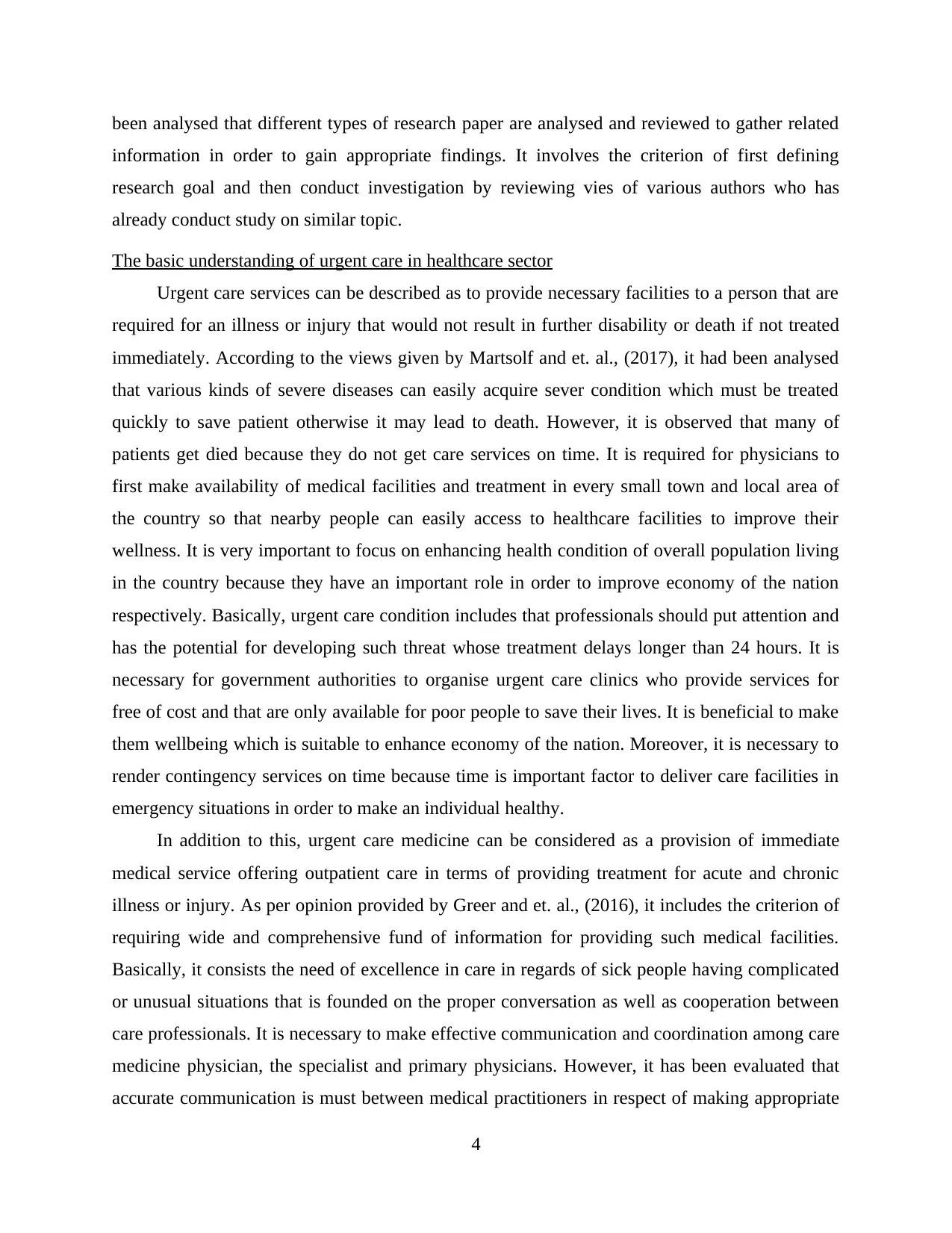
been analysed that different types of research paper are analysed and reviewed to gather related
information in order to gain appropriate findings. It involves the criterion of first defining
research goal and then conduct investigation by reviewing vies of various authors who has
already conduct study on similar topic.
The basic understanding of urgent care in healthcare sector
Urgent care services can be described as to provide necessary facilities to a person that are
required for an illness or injury that would not result in further disability or death if not treated
immediately. According to the views given by Martsolf and et. al., (2017), it had been analysed
that various kinds of severe diseases can easily acquire sever condition which must be treated
quickly to save patient otherwise it may lead to death. However, it is observed that many of
patients get died because they do not get care services on time. It is required for physicians to
first make availability of medical facilities and treatment in every small town and local area of
the country so that nearby people can easily access to healthcare facilities to improve their
wellness. It is very important to focus on enhancing health condition of overall population living
in the country because they have an important role in order to improve economy of the nation
respectively. Basically, urgent care condition includes that professionals should put attention and
has the potential for developing such threat whose treatment delays longer than 24 hours. It is
necessary for government authorities to organise urgent care clinics who provide services for
free of cost and that are only available for poor people to save their lives. It is beneficial to make
them wellbeing which is suitable to enhance economy of the nation. Moreover, it is necessary to
render contingency services on time because time is important factor to deliver care facilities in
emergency situations in order to make an individual healthy.
In addition to this, urgent care medicine can be considered as a provision of immediate
medical service offering outpatient care in terms of providing treatment for acute and chronic
illness or injury. As per opinion provided by Greer and et. al., (2016), it includes the criterion of
requiring wide and comprehensive fund of information for providing such medical facilities.
Basically, it consists the need of excellence in care in regards of sick people having complicated
or unusual situations that is founded on the proper conversation as well as cooperation between
care professionals. It is necessary to make effective communication and coordination among care
medicine physician, the specialist and primary physicians. However, it has been evaluated that
accurate communication is must between medical practitioners in respect of making appropriate
4
information in order to gain appropriate findings. It involves the criterion of first defining
research goal and then conduct investigation by reviewing vies of various authors who has
already conduct study on similar topic.
The basic understanding of urgent care in healthcare sector
Urgent care services can be described as to provide necessary facilities to a person that are
required for an illness or injury that would not result in further disability or death if not treated
immediately. According to the views given by Martsolf and et. al., (2017), it had been analysed
that various kinds of severe diseases can easily acquire sever condition which must be treated
quickly to save patient otherwise it may lead to death. However, it is observed that many of
patients get died because they do not get care services on time. It is required for physicians to
first make availability of medical facilities and treatment in every small town and local area of
the country so that nearby people can easily access to healthcare facilities to improve their
wellness. It is very important to focus on enhancing health condition of overall population living
in the country because they have an important role in order to improve economy of the nation
respectively. Basically, urgent care condition includes that professionals should put attention and
has the potential for developing such threat whose treatment delays longer than 24 hours. It is
necessary for government authorities to organise urgent care clinics who provide services for
free of cost and that are only available for poor people to save their lives. It is beneficial to make
them wellbeing which is suitable to enhance economy of the nation. Moreover, it is necessary to
render contingency services on time because time is important factor to deliver care facilities in
emergency situations in order to make an individual healthy.
In addition to this, urgent care medicine can be considered as a provision of immediate
medical service offering outpatient care in terms of providing treatment for acute and chronic
illness or injury. As per opinion provided by Greer and et. al., (2016), it includes the criterion of
requiring wide and comprehensive fund of information for providing such medical facilities.
Basically, it consists the need of excellence in care in regards of sick people having complicated
or unusual situations that is founded on the proper conversation as well as cooperation between
care professionals. It is necessary to make effective communication and coordination among care
medicine physician, the specialist and primary physicians. However, it has been evaluated that
accurate communication is must between medical practitioners in respect of making appropriate
4
Paraphrase This Document
Need a fresh take? Get an instant paraphrase of this document with our AI Paraphraser
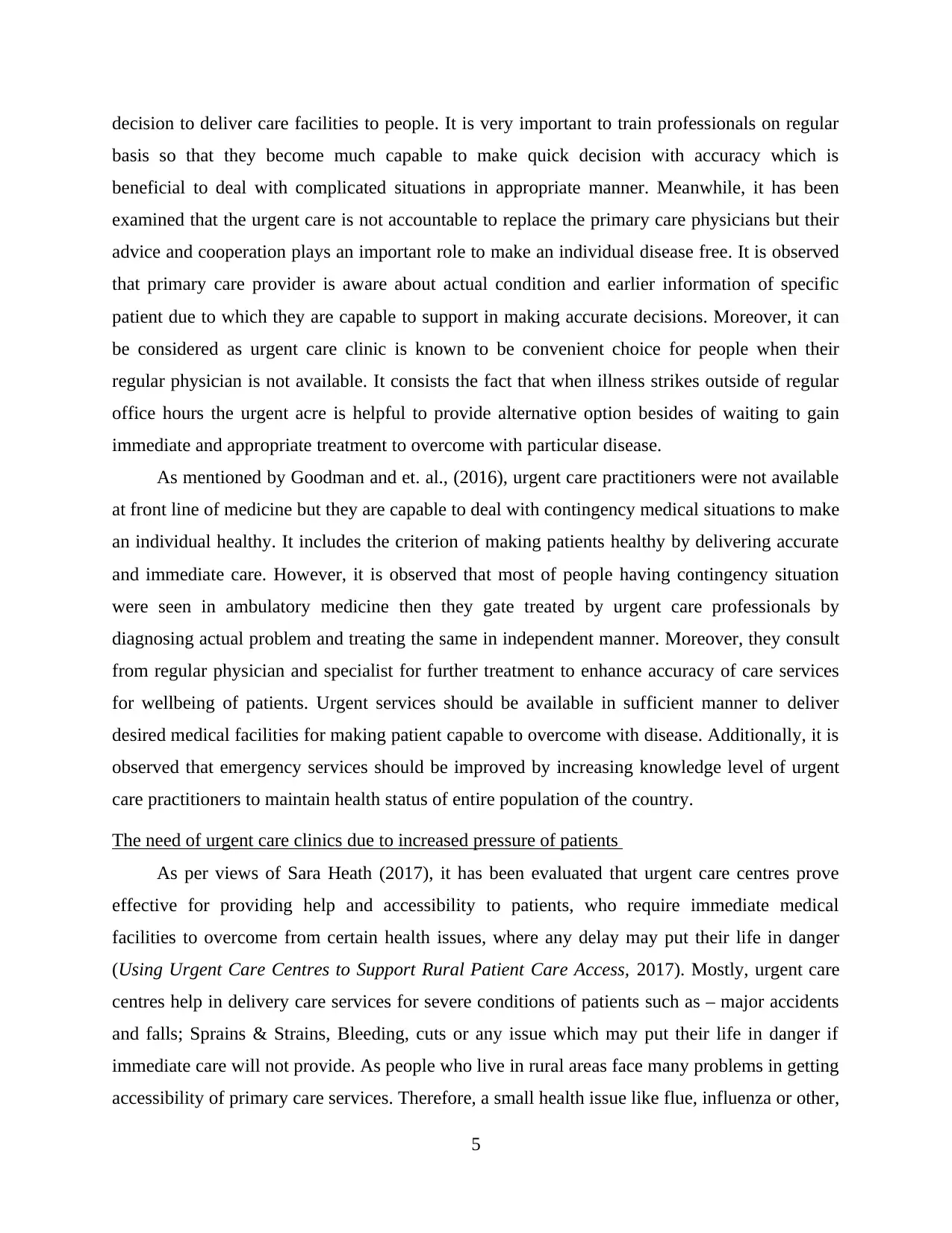
decision to deliver care facilities to people. It is very important to train professionals on regular
basis so that they become much capable to make quick decision with accuracy which is
beneficial to deal with complicated situations in appropriate manner. Meanwhile, it has been
examined that the urgent care is not accountable to replace the primary care physicians but their
advice and cooperation plays an important role to make an individual disease free. It is observed
that primary care provider is aware about actual condition and earlier information of specific
patient due to which they are capable to support in making accurate decisions. Moreover, it can
be considered as urgent care clinic is known to be convenient choice for people when their
regular physician is not available. It consists the fact that when illness strikes outside of regular
office hours the urgent acre is helpful to provide alternative option besides of waiting to gain
immediate and appropriate treatment to overcome with particular disease.
As mentioned by Goodman and et. al., (2016), urgent care practitioners were not available
at front line of medicine but they are capable to deal with contingency medical situations to make
an individual healthy. It includes the criterion of making patients healthy by delivering accurate
and immediate care. However, it is observed that most of people having contingency situation
were seen in ambulatory medicine then they gate treated by urgent care professionals by
diagnosing actual problem and treating the same in independent manner. Moreover, they consult
from regular physician and specialist for further treatment to enhance accuracy of care services
for wellbeing of patients. Urgent services should be available in sufficient manner to deliver
desired medical facilities for making patient capable to overcome with disease. Additionally, it is
observed that emergency services should be improved by increasing knowledge level of urgent
care practitioners to maintain health status of entire population of the country.
The need of urgent care clinics due to increased pressure of patients
As per views of Sara Heath (2017), it has been evaluated that urgent care centres prove
effective for providing help and accessibility to patients, who require immediate medical
facilities to overcome from certain health issues, where any delay may put their life in danger
(Using Urgent Care Centres to Support Rural Patient Care Access, 2017). Mostly, urgent care
centres help in delivery care services for severe conditions of patients such as – major accidents
and falls; Sprains & Strains, Bleeding, cuts or any issue which may put their life in danger if
immediate care will not provide. As people who live in rural areas face many problems in getting
accessibility of primary care services. Therefore, a small health issue like flue, influenza or other,
5
basis so that they become much capable to make quick decision with accuracy which is
beneficial to deal with complicated situations in appropriate manner. Meanwhile, it has been
examined that the urgent care is not accountable to replace the primary care physicians but their
advice and cooperation plays an important role to make an individual disease free. It is observed
that primary care provider is aware about actual condition and earlier information of specific
patient due to which they are capable to support in making accurate decisions. Moreover, it can
be considered as urgent care clinic is known to be convenient choice for people when their
regular physician is not available. It consists the fact that when illness strikes outside of regular
office hours the urgent acre is helpful to provide alternative option besides of waiting to gain
immediate and appropriate treatment to overcome with particular disease.
As mentioned by Goodman and et. al., (2016), urgent care practitioners were not available
at front line of medicine but they are capable to deal with contingency medical situations to make
an individual healthy. It includes the criterion of making patients healthy by delivering accurate
and immediate care. However, it is observed that most of people having contingency situation
were seen in ambulatory medicine then they gate treated by urgent care professionals by
diagnosing actual problem and treating the same in independent manner. Moreover, they consult
from regular physician and specialist for further treatment to enhance accuracy of care services
for wellbeing of patients. Urgent services should be available in sufficient manner to deliver
desired medical facilities for making patient capable to overcome with disease. Additionally, it is
observed that emergency services should be improved by increasing knowledge level of urgent
care practitioners to maintain health status of entire population of the country.
The need of urgent care clinics due to increased pressure of patients
As per views of Sara Heath (2017), it has been evaluated that urgent care centres prove
effective for providing help and accessibility to patients, who require immediate medical
facilities to overcome from certain health issues, where any delay may put their life in danger
(Using Urgent Care Centres to Support Rural Patient Care Access, 2017). Mostly, urgent care
centres help in delivery care services for severe conditions of patients such as – major accidents
and falls; Sprains & Strains, Bleeding, cuts or any issue which may put their life in danger if
immediate care will not provide. As people who live in rural areas face many problems in getting
accessibility of primary care services. Therefore, a small health issue like flue, influenza or other,
5
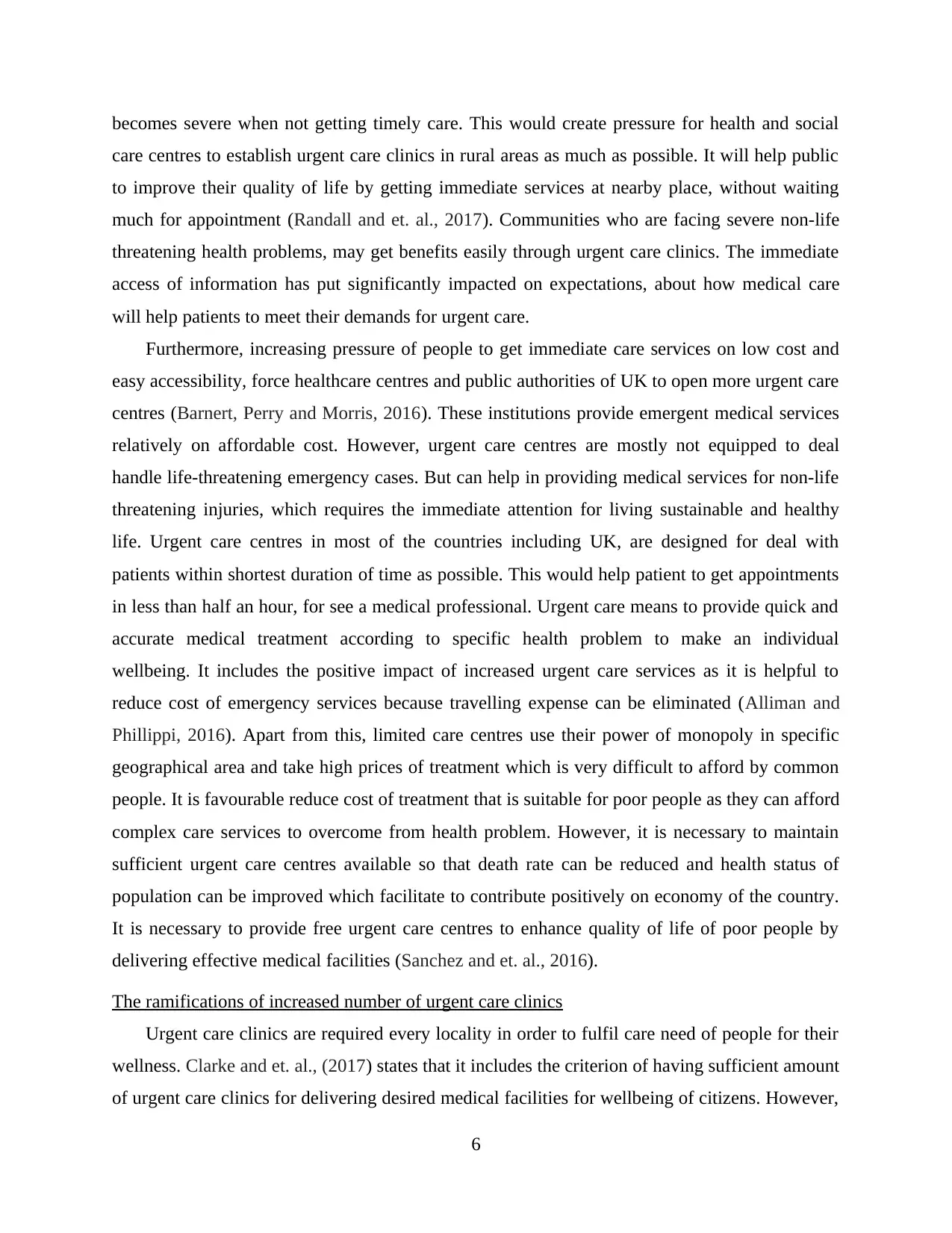
becomes severe when not getting timely care. This would create pressure for health and social
care centres to establish urgent care clinics in rural areas as much as possible. It will help public
to improve their quality of life by getting immediate services at nearby place, without waiting
much for appointment (Randall and et. al., 2017). Communities who are facing severe non-life
threatening health problems, may get benefits easily through urgent care clinics. The immediate
access of information has put significantly impacted on expectations, about how medical care
will help patients to meet their demands for urgent care.
Furthermore, increasing pressure of people to get immediate care services on low cost and
easy accessibility, force healthcare centres and public authorities of UK to open more urgent care
centres (Barnert, Perry and Morris, 2016). These institutions provide emergent medical services
relatively on affordable cost. However, urgent care centres are mostly not equipped to deal
handle life-threatening emergency cases. But can help in providing medical services for non-life
threatening injuries, which requires the immediate attention for living sustainable and healthy
life. Urgent care centres in most of the countries including UK, are designed for deal with
patients within shortest duration of time as possible. This would help patient to get appointments
in less than half an hour, for see a medical professional. Urgent care means to provide quick and
accurate medical treatment according to specific health problem to make an individual
wellbeing. It includes the positive impact of increased urgent care services as it is helpful to
reduce cost of emergency services because travelling expense can be eliminated (Alliman and
Phillippi, 2016). Apart from this, limited care centres use their power of monopoly in specific
geographical area and take high prices of treatment which is very difficult to afford by common
people. It is favourable reduce cost of treatment that is suitable for poor people as they can afford
complex care services to overcome from health problem. However, it is necessary to maintain
sufficient urgent care centres available so that death rate can be reduced and health status of
population can be improved which facilitate to contribute positively on economy of the country.
It is necessary to provide free urgent care centres to enhance quality of life of poor people by
delivering effective medical facilities (Sanchez and et. al., 2016).
The ramifications of increased number of urgent care clinics
Urgent care clinics are required every locality in order to fulfil care need of people for their
wellness. Clarke and et. al., (2017) states that it includes the criterion of having sufficient amount
of urgent care clinics for delivering desired medical facilities for wellbeing of citizens. However,
6
care centres to establish urgent care clinics in rural areas as much as possible. It will help public
to improve their quality of life by getting immediate services at nearby place, without waiting
much for appointment (Randall and et. al., 2017). Communities who are facing severe non-life
threatening health problems, may get benefits easily through urgent care clinics. The immediate
access of information has put significantly impacted on expectations, about how medical care
will help patients to meet their demands for urgent care.
Furthermore, increasing pressure of people to get immediate care services on low cost and
easy accessibility, force healthcare centres and public authorities of UK to open more urgent care
centres (Barnert, Perry and Morris, 2016). These institutions provide emergent medical services
relatively on affordable cost. However, urgent care centres are mostly not equipped to deal
handle life-threatening emergency cases. But can help in providing medical services for non-life
threatening injuries, which requires the immediate attention for living sustainable and healthy
life. Urgent care centres in most of the countries including UK, are designed for deal with
patients within shortest duration of time as possible. This would help patient to get appointments
in less than half an hour, for see a medical professional. Urgent care means to provide quick and
accurate medical treatment according to specific health problem to make an individual
wellbeing. It includes the positive impact of increased urgent care services as it is helpful to
reduce cost of emergency services because travelling expense can be eliminated (Alliman and
Phillippi, 2016). Apart from this, limited care centres use their power of monopoly in specific
geographical area and take high prices of treatment which is very difficult to afford by common
people. It is favourable reduce cost of treatment that is suitable for poor people as they can afford
complex care services to overcome from health problem. However, it is necessary to maintain
sufficient urgent care centres available so that death rate can be reduced and health status of
population can be improved which facilitate to contribute positively on economy of the country.
It is necessary to provide free urgent care centres to enhance quality of life of poor people by
delivering effective medical facilities (Sanchez and et. al., 2016).
The ramifications of increased number of urgent care clinics
Urgent care clinics are required every locality in order to fulfil care need of people for their
wellness. Clarke and et. al., (2017) states that it includes the criterion of having sufficient amount
of urgent care clinics for delivering desired medical facilities for wellbeing of citizens. However,
6
⊘ This is a preview!⊘
Do you want full access?
Subscribe today to unlock all pages.

Trusted by 1+ million students worldwide
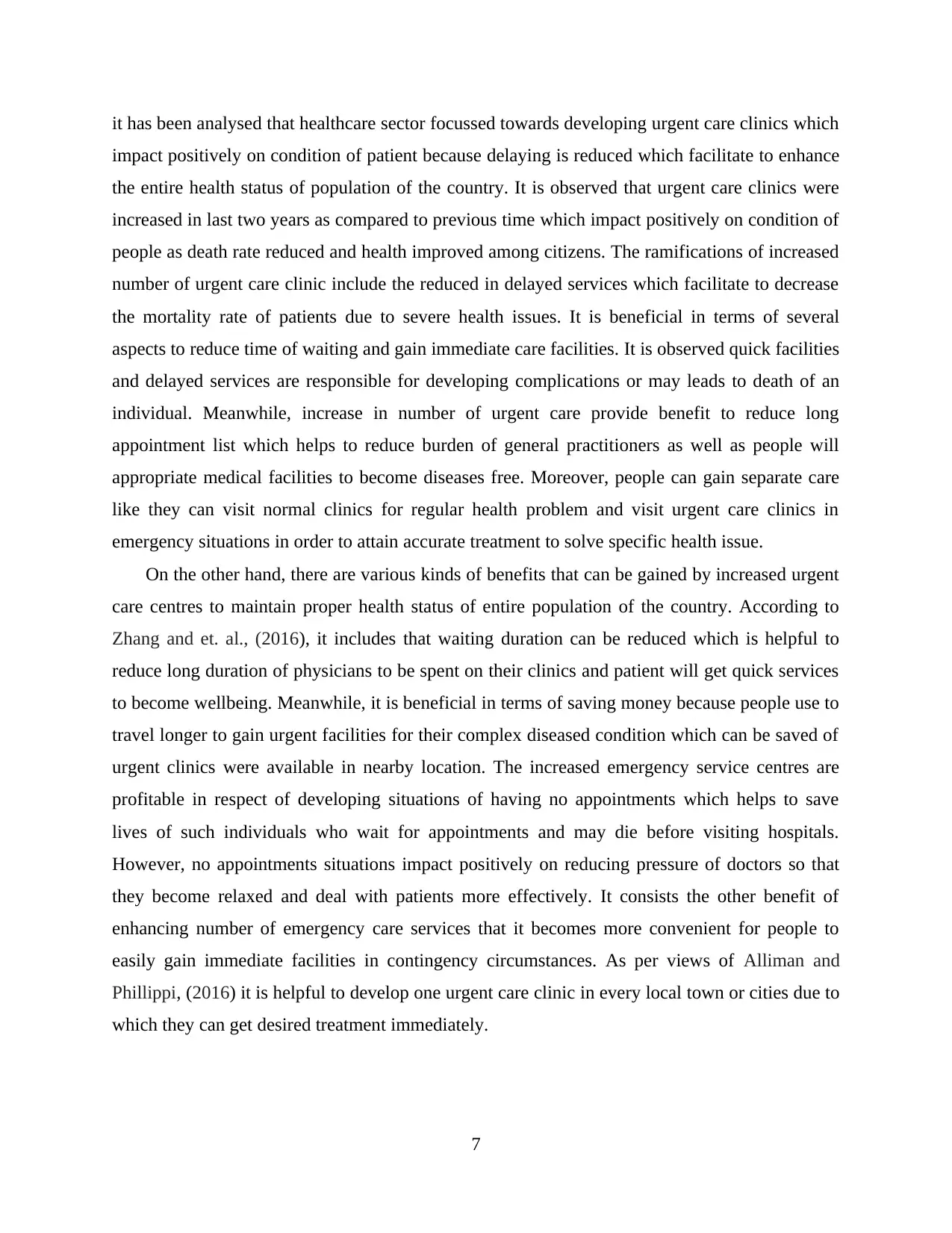
it has been analysed that healthcare sector focussed towards developing urgent care clinics which
impact positively on condition of patient because delaying is reduced which facilitate to enhance
the entire health status of population of the country. It is observed that urgent care clinics were
increased in last two years as compared to previous time which impact positively on condition of
people as death rate reduced and health improved among citizens. The ramifications of increased
number of urgent care clinic include the reduced in delayed services which facilitate to decrease
the mortality rate of patients due to severe health issues. It is beneficial in terms of several
aspects to reduce time of waiting and gain immediate care facilities. It is observed quick facilities
and delayed services are responsible for developing complications or may leads to death of an
individual. Meanwhile, increase in number of urgent care provide benefit to reduce long
appointment list which helps to reduce burden of general practitioners as well as people will
appropriate medical facilities to become diseases free. Moreover, people can gain separate care
like they can visit normal clinics for regular health problem and visit urgent care clinics in
emergency situations in order to attain accurate treatment to solve specific health issue.
On the other hand, there are various kinds of benefits that can be gained by increased urgent
care centres to maintain proper health status of entire population of the country. According to
Zhang and et. al., (2016), it includes that waiting duration can be reduced which is helpful to
reduce long duration of physicians to be spent on their clinics and patient will get quick services
to become wellbeing. Meanwhile, it is beneficial in terms of saving money because people use to
travel longer to gain urgent facilities for their complex diseased condition which can be saved of
urgent clinics were available in nearby location. The increased emergency service centres are
profitable in respect of developing situations of having no appointments which helps to save
lives of such individuals who wait for appointments and may die before visiting hospitals.
However, no appointments situations impact positively on reducing pressure of doctors so that
they become relaxed and deal with patients more effectively. It consists the other benefit of
enhancing number of emergency care services that it becomes more convenient for people to
easily gain immediate facilities in contingency circumstances. As per views of Alliman and
Phillippi, (2016) it is helpful to develop one urgent care clinic in every local town or cities due to
which they can get desired treatment immediately.
7
impact positively on condition of patient because delaying is reduced which facilitate to enhance
the entire health status of population of the country. It is observed that urgent care clinics were
increased in last two years as compared to previous time which impact positively on condition of
people as death rate reduced and health improved among citizens. The ramifications of increased
number of urgent care clinic include the reduced in delayed services which facilitate to decrease
the mortality rate of patients due to severe health issues. It is beneficial in terms of several
aspects to reduce time of waiting and gain immediate care facilities. It is observed quick facilities
and delayed services are responsible for developing complications or may leads to death of an
individual. Meanwhile, increase in number of urgent care provide benefit to reduce long
appointment list which helps to reduce burden of general practitioners as well as people will
appropriate medical facilities to become diseases free. Moreover, people can gain separate care
like they can visit normal clinics for regular health problem and visit urgent care clinics in
emergency situations in order to attain accurate treatment to solve specific health issue.
On the other hand, there are various kinds of benefits that can be gained by increased urgent
care centres to maintain proper health status of entire population of the country. According to
Zhang and et. al., (2016), it includes that waiting duration can be reduced which is helpful to
reduce long duration of physicians to be spent on their clinics and patient will get quick services
to become wellbeing. Meanwhile, it is beneficial in terms of saving money because people use to
travel longer to gain urgent facilities for their complex diseased condition which can be saved of
urgent clinics were available in nearby location. The increased emergency service centres are
profitable in respect of developing situations of having no appointments which helps to save
lives of such individuals who wait for appointments and may die before visiting hospitals.
However, no appointments situations impact positively on reducing pressure of doctors so that
they become relaxed and deal with patients more effectively. It consists the other benefit of
enhancing number of emergency care services that it becomes more convenient for people to
easily gain immediate facilities in contingency circumstances. As per views of Alliman and
Phillippi, (2016) it is helpful to develop one urgent care clinic in every local town or cities due to
which they can get desired treatment immediately.
7
Paraphrase This Document
Need a fresh take? Get an instant paraphrase of this document with our AI Paraphraser
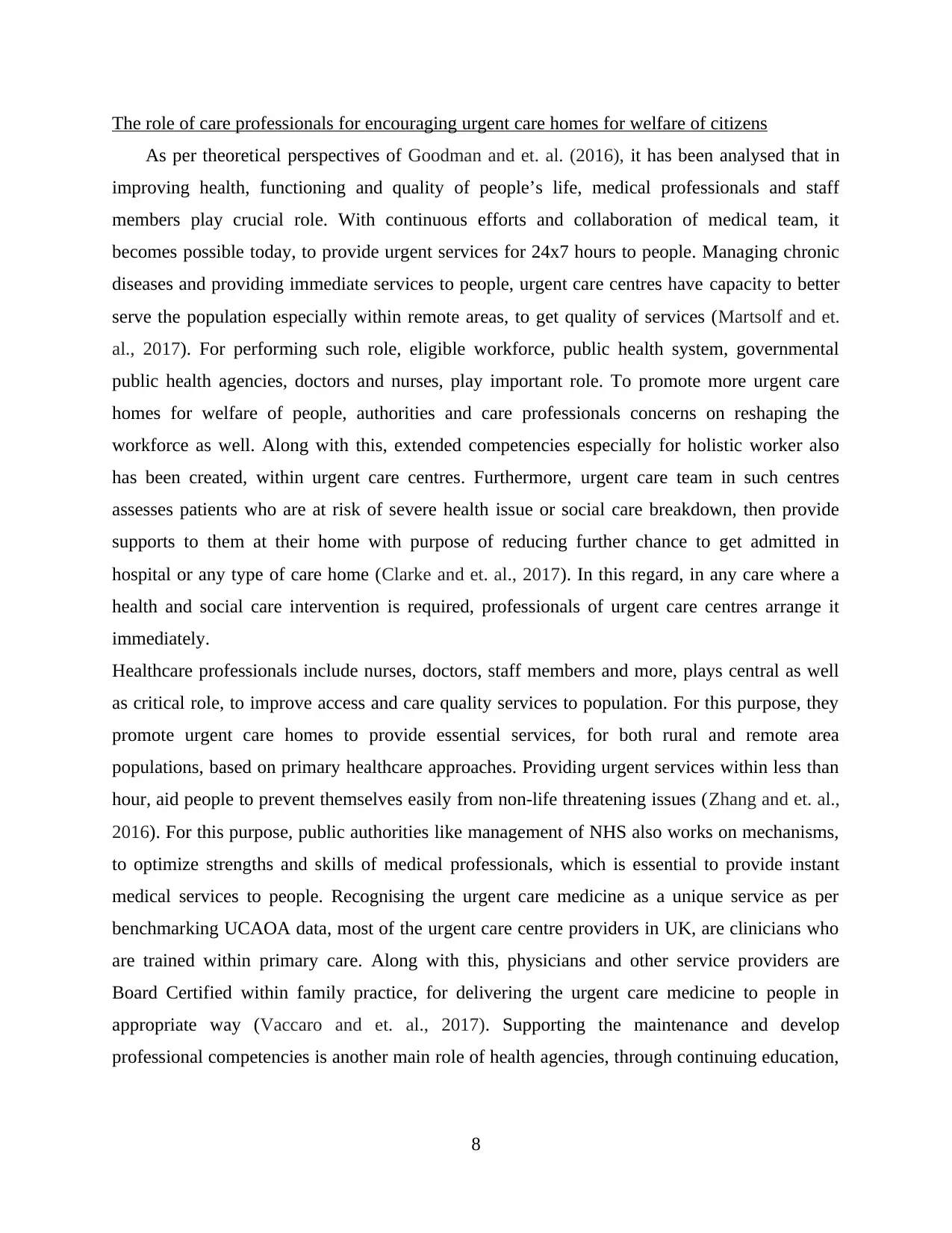
The role of care professionals for encouraging urgent care homes for welfare of citizens
As per theoretical perspectives of Goodman and et. al. (2016), it has been analysed that in
improving health, functioning and quality of people’s life, medical professionals and staff
members play crucial role. With continuous efforts and collaboration of medical team, it
becomes possible today, to provide urgent services for 24x7 hours to people. Managing chronic
diseases and providing immediate services to people, urgent care centres have capacity to better
serve the population especially within remote areas, to get quality of services (Martsolf and et.
al., 2017). For performing such role, eligible workforce, public health system, governmental
public health agencies, doctors and nurses, play important role. To promote more urgent care
homes for welfare of people, authorities and care professionals concerns on reshaping the
workforce as well. Along with this, extended competencies especially for holistic worker also
has been created, within urgent care centres. Furthermore, urgent care team in such centres
assesses patients who are at risk of severe health issue or social care breakdown, then provide
supports to them at their home with purpose of reducing further chance to get admitted in
hospital or any type of care home (Clarke and et. al., 2017). In this regard, in any care where a
health and social care intervention is required, professionals of urgent care centres arrange it
immediately.
Healthcare professionals include nurses, doctors, staff members and more, plays central as well
as critical role, to improve access and care quality services to population. For this purpose, they
promote urgent care homes to provide essential services, for both rural and remote area
populations, based on primary healthcare approaches. Providing urgent services within less than
hour, aid people to prevent themselves easily from non-life threatening issues (Zhang and et. al.,
2016). For this purpose, public authorities like management of NHS also works on mechanisms,
to optimize strengths and skills of medical professionals, which is essential to provide instant
medical services to people. Recognising the urgent care medicine as a unique service as per
benchmarking UCAOA data, most of the urgent care centre providers in UK, are clinicians who
are trained within primary care. Along with this, physicians and other service providers are
Board Certified within family practice, for delivering the urgent care medicine to people in
appropriate way (Vaccaro and et. al., 2017). Supporting the maintenance and develop
professional competencies is another main role of health agencies, through continuing education,
8
As per theoretical perspectives of Goodman and et. al. (2016), it has been analysed that in
improving health, functioning and quality of people’s life, medical professionals and staff
members play crucial role. With continuous efforts and collaboration of medical team, it
becomes possible today, to provide urgent services for 24x7 hours to people. Managing chronic
diseases and providing immediate services to people, urgent care centres have capacity to better
serve the population especially within remote areas, to get quality of services (Martsolf and et.
al., 2017). For performing such role, eligible workforce, public health system, governmental
public health agencies, doctors and nurses, play important role. To promote more urgent care
homes for welfare of people, authorities and care professionals concerns on reshaping the
workforce as well. Along with this, extended competencies especially for holistic worker also
has been created, within urgent care centres. Furthermore, urgent care team in such centres
assesses patients who are at risk of severe health issue or social care breakdown, then provide
supports to them at their home with purpose of reducing further chance to get admitted in
hospital or any type of care home (Clarke and et. al., 2017). In this regard, in any care where a
health and social care intervention is required, professionals of urgent care centres arrange it
immediately.
Healthcare professionals include nurses, doctors, staff members and more, plays central as well
as critical role, to improve access and care quality services to population. For this purpose, they
promote urgent care homes to provide essential services, for both rural and remote area
populations, based on primary healthcare approaches. Providing urgent services within less than
hour, aid people to prevent themselves easily from non-life threatening issues (Zhang and et. al.,
2016). For this purpose, public authorities like management of NHS also works on mechanisms,
to optimize strengths and skills of medical professionals, which is essential to provide instant
medical services to people. Recognising the urgent care medicine as a unique service as per
benchmarking UCAOA data, most of the urgent care centre providers in UK, are clinicians who
are trained within primary care. Along with this, physicians and other service providers are
Board Certified within family practice, for delivering the urgent care medicine to people in
appropriate way (Vaccaro and et. al., 2017). Supporting the maintenance and develop
professional competencies is another main role of health agencies, through continuing education,
8
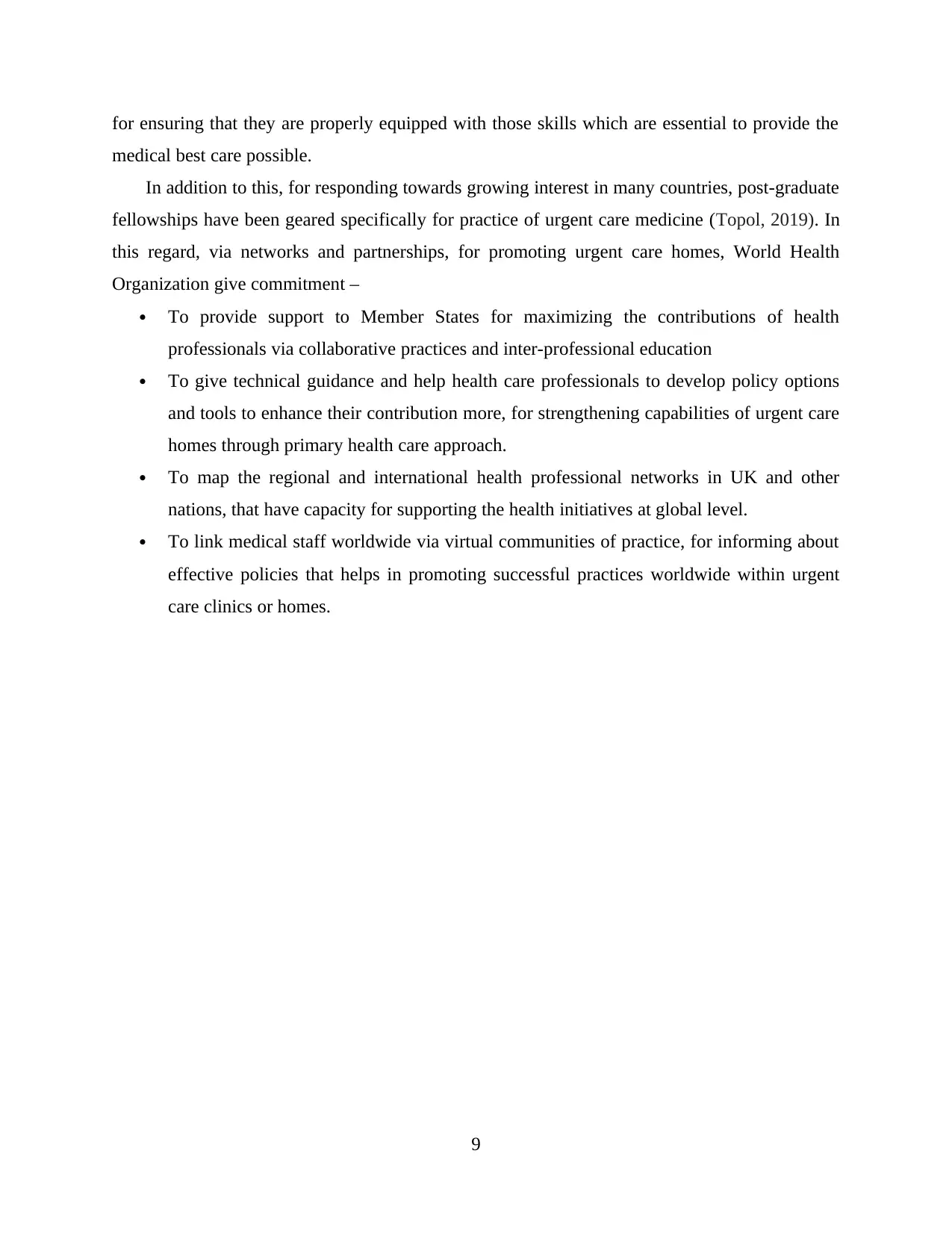
for ensuring that they are properly equipped with those skills which are essential to provide the
medical best care possible.
In addition to this, for responding towards growing interest in many countries, post-graduate
fellowships have been geared specifically for practice of urgent care medicine (Topol, 2019). In
this regard, via networks and partnerships, for promoting urgent care homes, World Health
Organization give commitment –
To provide support to Member States for maximizing the contributions of health
professionals via collaborative practices and inter-professional education
To give technical guidance and help health care professionals to develop policy options
and tools to enhance their contribution more, for strengthening capabilities of urgent care
homes through primary health care approach.
To map the regional and international health professional networks in UK and other
nations, that have capacity for supporting the health initiatives at global level.
To link medical staff worldwide via virtual communities of practice, for informing about
effective policies that helps in promoting successful practices worldwide within urgent
care clinics or homes.
9
medical best care possible.
In addition to this, for responding towards growing interest in many countries, post-graduate
fellowships have been geared specifically for practice of urgent care medicine (Topol, 2019). In
this regard, via networks and partnerships, for promoting urgent care homes, World Health
Organization give commitment –
To provide support to Member States for maximizing the contributions of health
professionals via collaborative practices and inter-professional education
To give technical guidance and help health care professionals to develop policy options
and tools to enhance their contribution more, for strengthening capabilities of urgent care
homes through primary health care approach.
To map the regional and international health professional networks in UK and other
nations, that have capacity for supporting the health initiatives at global level.
To link medical staff worldwide via virtual communities of practice, for informing about
effective policies that helps in promoting successful practices worldwide within urgent
care clinics or homes.
9
⊘ This is a preview!⊘
Do you want full access?
Subscribe today to unlock all pages.

Trusted by 1+ million students worldwide
1 out of 18
Related Documents
Your All-in-One AI-Powered Toolkit for Academic Success.
+13062052269
info@desklib.com
Available 24*7 on WhatsApp / Email
![[object Object]](/_next/static/media/star-bottom.7253800d.svg)
Unlock your academic potential
Copyright © 2020–2026 A2Z Services. All Rights Reserved. Developed and managed by ZUCOL.





